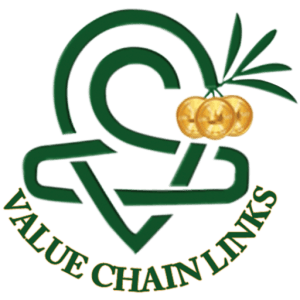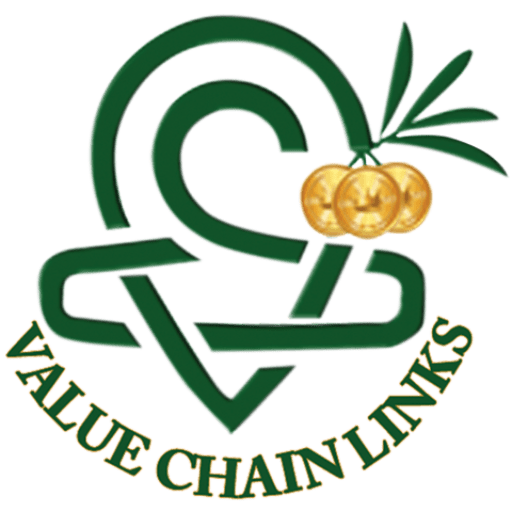WHAT DO WE DO WHEN OUR PAST EXPERIENCES CAUSES US TO ACT IN CONTRARY TO OUR SELF-INTEREST
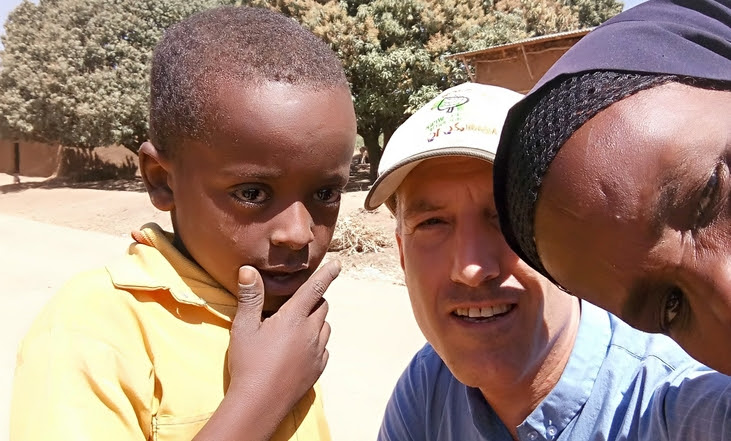
BY DR. NIMROD
It was 1989, and I was in charge of crop protection in 21 plots, primarily apples, but also nectarines, cherry, pears, and walnuts.
At that time, the essential trait of a pest control officer was his ability to spray well, and I was spraying well! With the help of the extension services’ experts, I had a well-designed plan to fulfill and …spray!
Once a week, I would walk through the plots with the experts. Then we would sit and decide on a spray program for the coming week. This method is called Prophylactic Sprays; you apply preventative sprays before a problem occurs.
Unfortunately, the pests chose not to participate in this game, and I had experienced many problems! It seemed that the more I was spraying, the greater the problems were.
It was a battle in which the pests were winning, and then I was spraying just to achieve a momentary victory and get some rest.
But there was one exception to the rule; one old apple plot. This plot was so old, so far away, with so little yield that we decided to give it just enough water to keep it alive, but to save on other treatments, including pesticide sprays, aside from fruit flies before harvest.
Naturally, I was expecting this plot to be in terrible shape, in chaos, flooded with pests, but to my surprise, it wasn’t; it was well balanced by natural enemies, with minor crop protection problems!
It was an enigma for me, which I didn’t know how to explain or bridge the contradiction. On the one hand, I was practicing an intensive crop protection regime using many sprays, which I was taught to believe is the most advanced and the best!
At the same time, I experienced and saw with my own eyes how the heavily sprayed plots suffer from never-ending pests’ attack, while the best results achieved in the plot that was less treated.
It was a conflict, which I couldn’t bridge, and hence continued doing the same as the “expert” advised, which was countering my real-life experience and facts.
I began losing my confidence in the mainstream crop protection world-view.
Today I know that psychologists refer to that kind of clash between expectations and reality as Cognitive Dissonance.
“The term cognitive dissonance is used to describe the mental discomfort that results from holding two conflicting beliefs, values, or attitudes.” [>><<]
Cognitive Dissonance is common in situations and matters related to new concepts, products, and services. Failure to detect cognitive dissonance can turn out to be costly, literally, as it often causes us to act in ways that contradict our self-interest.

COGNITIVE DISSONANCE IS NOT RARE
There are many Cognitive Dissonance cases related to the introduction of novel technologies, services, and concepts.
Here are three examples that represent well how poor is our ability to capture the potential long-term future impact of technology, service, or a concept in its early stages –
Cars – first perceived as a non-reliable expensive cart. In practice, Cars changed the way we perceive distances. Today it repeats itself with electric cars versus internal combustion engines, where the old companies miss to see that it is no more about transportation from point A to B, but about being environmentally friendly.
Vaccines – were first compared to medications, aiming to make you feel better after you get sick. When first introduced, people were reluctant to inject something into their bodies to protect themselves “in case of…” while they are perfectly healthy. In practice, vaccines saved more lives than medicine cures, and as we know from COVID-19, it helps to get our life (and trade) back to “normal.” Vaccines enabled humanity, for the first time, to eradicate diseases like smallpox.
Smartphone – Nokia’s engineers related to the iPhone as a “not so good mobile phone,” failing to see that it will also be a telephone, but mostly a substitute for computers, cameras, internet, location-based services, etc.
THE HIGH PRICE TAG OF COGNITIVE DISSONANCE
Think about what happened to companies that, due to a state of Cognitive Dissonance, had not changed their attitude or behavior on time, e.g., Nokia. Ultimately, their long-term interest has been severely damaged.
How many companies do you know that still make carts, or “wonder medicines” to prevent smallpox, or line telephones?
Companies and countries who remained captives in the hands of a misleading Cognitive Dissonance were left behind and become, in the global perceptive, non-relevant.
According to the Cognitive Dissonance theory, the solution to the “inconsistency,” also related to as “unpleasant state” or “mental discomfort,” is by CHANGING one or more of the factors affecting it; Attitude, Behavior, or Behavior Perception.
Can you think of a Cognitive Dissonance within the agro-industry and its possible negative impact?
AN UP-TO-DATE PAINFUL EXAMPLE
The agro-industry is packed with Cognitive Dissonance and more so in the emerging economies.
Emerging economies will need to confront their main Cognitive Dissonances demons to overcome current difficulties, create a thriving economic future, or bear the consequences and suffering involved in the continuation of the situation.
The mango industry provides us one of those iconic Cognitive Dissonance cases. We can learn a lot from the case of Sub-Saharan Africa countries (S.S. Africa), where the mango industry is significant and central.
In the past decade, S.S. Africa governments, stakeholders, and mango growers have invested tremendous amounts in advancing mango exports to the EU, but instead, the volume decreased.
In contrast, mango exports from Latin America to the EU have sharply increased!
How is that possible while the EU is increasing its fresh mango import demands?
Has the EU reduced mango import from S.S. Africa because of irrelevant motives?
Based on my observations, I want to suggest that the decrease in fresh mango exports from S.S. Africa to the EU results from Cognitive Dissonance and the mental bias it creates.
Below you will find a series of illustrations, each presenting issues typical to an element (party) of the fresh mango export value chain from Sub-Sahara Africa to the EU markets.
Each illustration presents the Cognitive Dissonance (Attitude versus Behavior) related to that specific party and its negative impact on the entire fresh mango export industry.
This is an opportunity to glance into the fresh mango export value chain through the Cognitive Dissonance theory’s spectacles.
By its nature, this analysis is generalizing, not complete, and not dealing with all situations and aspects. However, this exercise aims to enlighten the case by giving the Big Picture perspective, which is somewhat alarming.
In this spirit, please view the illustrations and their content as a tool that, in rough lines, can help to clarify the macro-state of the fresh mango export industry. This may reflect the state of other sectors and industries in the emerging economies as well.
It may further serve as a tool/method to support decision-makers and stakeholders in changing the attitude and behavior, ready to improve future results.
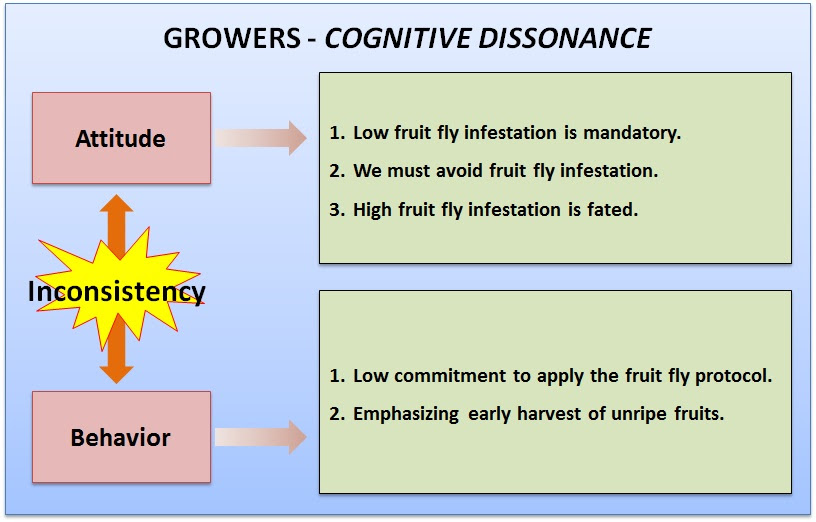
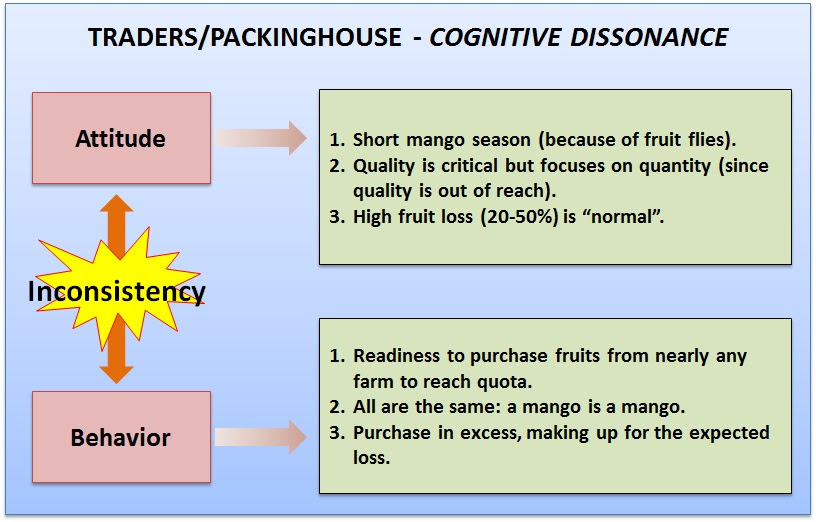
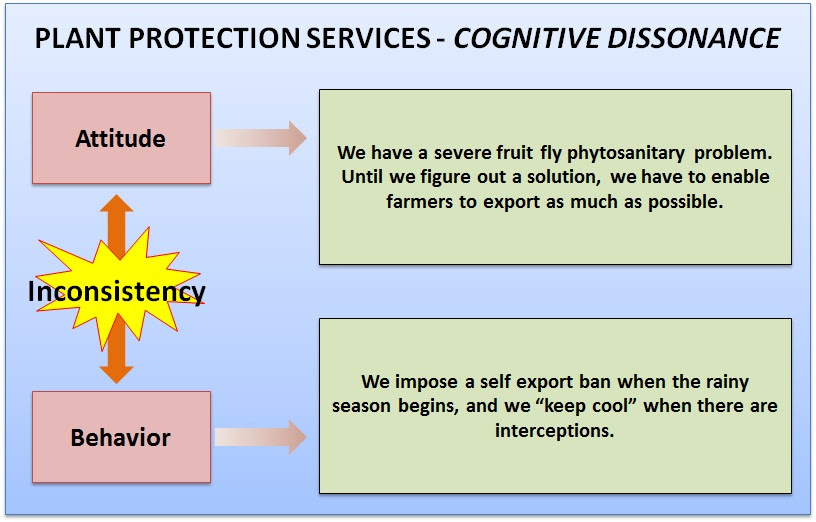


Today S.S. Africa exports to the EU are experiencing an export deficit of 130,000 tons compared to the expected volume.
As can be seen, the key reason is that the connecting thread between all the value chain components is the systemic failure resulting from the inability to manage the control of fruit flies properly.
This can be attributed mainly to Cognitive Dissonance resulting from the mismanagement of fruit flies and its peripheral impact, which eventually affects consumers’ experience and satisfaction.
Currently, Brazil and other Latin American countries are feeling up that 130,000 tons gap.
In the next ten years, the EU is expecting to increase its import by additional 400,000 tons. That amount is valued at over a billion euros for the value chain partners and can generate a solid and stable multi-billion industry.
What will sub-Saharan Africa countries choose to do with this opportunity this time?
Will they sit on the sidelines and see how other regions take advantage of the opportunity? Will they change their attitude and actions to create a better future?
For S.S. Africa, not taking part in feeling the present and future gap seems to signal a clear risk. Such action would further push its farmers away from the EU lucrative markets, hence increasing poverty.
In contrast, taking part in filling up that gap is an opportunity for re-building their agro-industry based on sustainable foundations and a national challenge to show they can change and become leaders.
Suppose S.S. Africa countries will choose to fill up part of the EU’s present and future demands. In that case, their future depends mainly on how they change their Attitude and Behavior (actions) towards phytosanitary quarantine pests and mostly towards fruit flies.
SETTING FREE
As earlier explained, according to the Cognitive Dissonance theory, the solution to the “inconsistency,” also related to as “unpleasant state” or “mental discomfort,” is by CHANGING one or more of the factors affecting it; Attitude, Behavior, or Behavior Perception.
Due to the late stage of events and the significant lagging of the S.S. Africa mango export industry, there is a need to change all three factors at once.
Furthermore, I believe that the stakeholders in S.S. Africa are ready for such a change and looking forward to and eager to apply such changes.
The illustration below presents the full scale of the changes, which I believe are necessary and required to enable S.S. Africa farmers to take their place as leading food producers and exporters.
According to sustainable ecological principles, applying those changes will help create a high added value industry, which will support the local economy’s acceleration.
This very needed change will not happen by itself or over-night.
To assist the farmers in making such change, we developed and are implementing the Green Valley program.

| One should note that fruit flies are no longer a problem in farms operating under the Green Valley program and applying the FFCTZ protocol.By applying the FFCTZ protocol, the fresh mango export value chain gains unprecedented abilities and relative advantages, including:• To continue exports during the rainy season. • To extend the marketing period by several months. • To immediately increase the exported produce quality and quantity. • To harvest mangoes based on taste and other quality parameters rather than on the fruit fly population. • To market more varieties even during periods that are currently impossible due to fruit fly issues. • To get access to premium markets, where consumers appreciate added-value. • To get high added value. • To get foreign investments. • To bring state-of-the-art know-how and technologies. • To improve market access. • To create a “brand of quality.” This is not a dream; it is doable.It is already taking place while decreasing the use of fruit fly sprays by 99%. This is having a positive impact on farmers’ and consumers’ health and the environment.This creates an incentive for the key-value chain partners, farmers – packinghouse – exporters-importers – supermarkets, to tighten and improve cooperation by setting long-term agreements.Such agreements will increase various characteristics across the board, including; trust, farmers’ income, stability, and the ability to increase investments.We can change and create a much better future by being brave enough to face and overcome our cognitive dysfunction. |
| TAKEAWAYS» Cognitive Dissonance is a common phenomenon.» Not facing our Cognitive Dissonances mean that we continue acting against our self-interest.» The inability to properly manage fruit flies is the root cause for Cognitive Dissonances across the value chain of fresh fruit exports of many countries.» Green Valley – designed to address the challenges and problems that Cognitive Dissonance poses to us along the value chain. |
